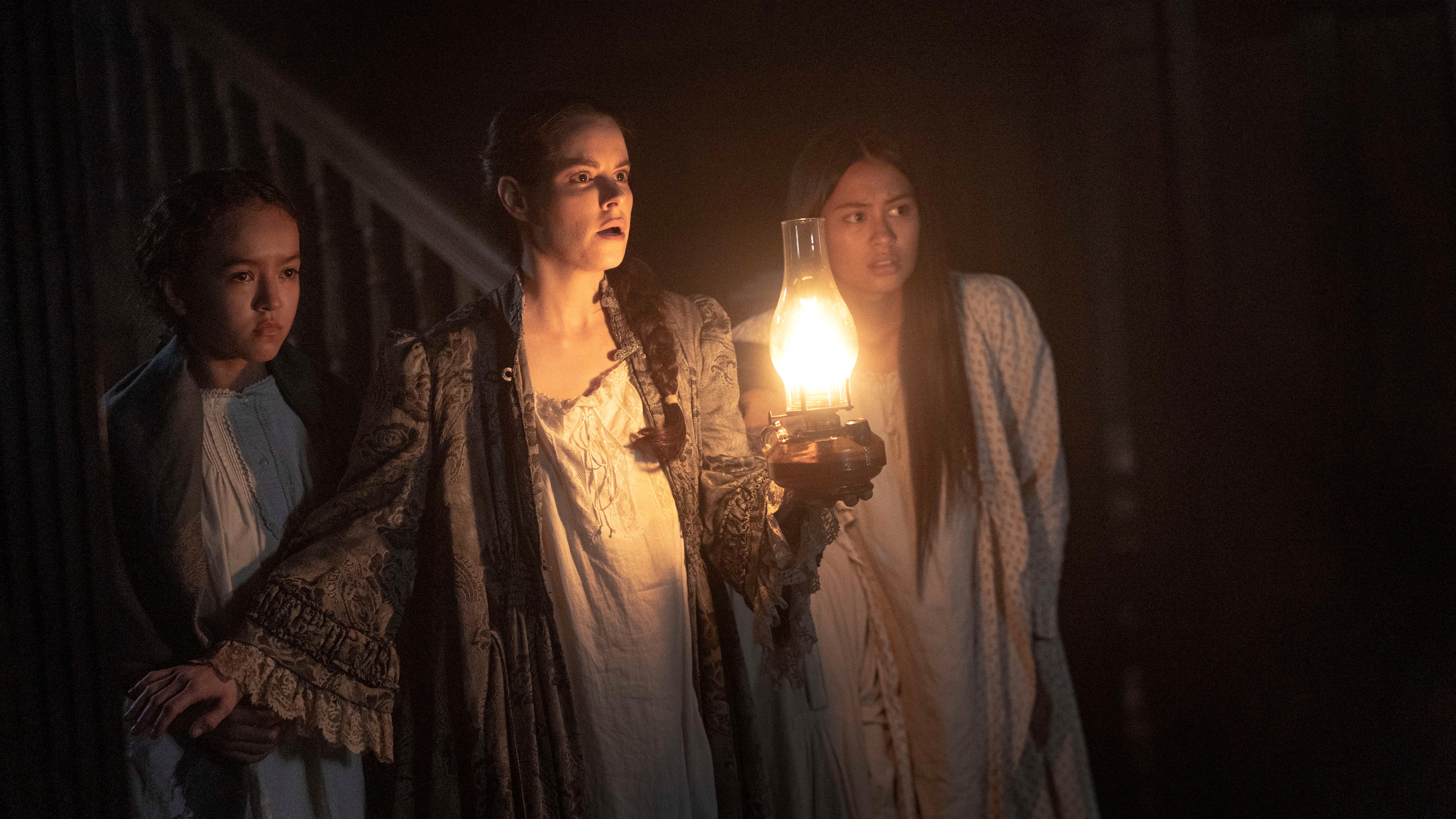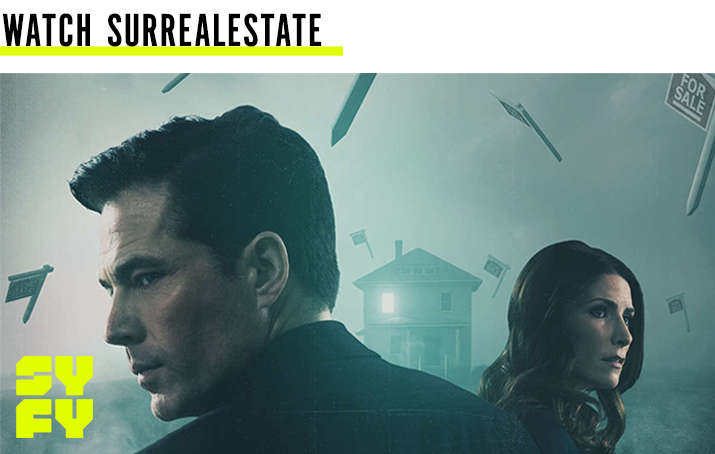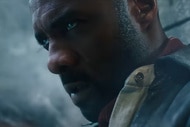Create a free profile to get unlimited access to exclusive videos, sweepstakes, and more!
Emily Hampshire talks going gothic in the horror series 'Chapelwaite'

Emily Hampshire recently won accolades for her work playing Jennifer Goines in SYFY’s 12 Monkeys and Stevie Budd in the Emmy-winning Schitt’s Creek, but the Canadian actress is no stranger to TV horror, having appeared on the '90s kids' horror classic Are You Afraid of the Dark? Now, Hampshire has returned to the genre in EPIX’s gothic horror series, Chapelwaite, where she co-stars alongside Adrien Brody as writer-turned-governess Rebecca Morgan.
A woman way ahead of her time, Rebecca is Mount Holyoke-educated but stuck in her provincial hometown of Preacher’s Corners, Maine. When widower Captain Charles Boone (Brody) and his three children move to town to take over his family’s mill, Rebecca offers herself as a teacher and guardian to the children. But she also sees them as the potential subjects of a magazine story as they take residence in a home that the town considers cursed.
While a period piece may seem like a surprising role for Hampshire, the actress tells SYFY WIRE that she actually started her career acting in various period piece miniseries for Canadian TV. After Schitt’s Creek launched her and that cast into the pop culture zeitgeist, Hampshire recalls her agent saying, “I want you out of those plaid, baggy jeans and back into a corset!"
Chapelwaite fits the bill of making sure Hampshire isn’t pigeonholed in the industry, but it’s also given her some perspective heading into new career challenges in the near future. Hampshire spoke with SYFY WIRE about Stephen King, working with Brody, unexpected Schitt's Creek parallels, and more.
What jumped out at you in particular about Chapelwaite?
When they came to me, I had just sold my own show [a Mary Hartman, Mary Hartman remake with Norman Lear] that I'm a writer on for the first time. And I was reading Stephen King's book called On Writing. I was literally reading that book when I got this script with an offer to play the role of Rebecca Morgan, who is a writer in a Stephen King [story]. That blew my mind! And I'm not going to go against the universe telling me to do this.
And then I read Jerusalem's Lot, the short story that [the show] was based on, and I'm like, "Wait a minute, my character is not in here?" But then I thought that Stephen King usually puts a writer in a lot of his stuff. I decided that if Stephen King was a very intelligent, educated, brown-haired girl in the 1880s, he would be Becky Morgan. I feel like Rebecca is the Stephen King writer character in this. And I love that it’s a woman and I love that [showrunners Peter and Jason Filardi] added this role — not that Stephen needs any help with his writing — but I think this is a great addition.
Can you talk about playing this character who lives in this extraordinarily isolated place, who wants out and then gets the challenge of embedding herself as an observer of this family?
You know, when you just described that I was like, "Oh my god, that is Stevie!" I didn't even think about it until you said that. But what I loved about it was this very modern woman, so ahead of her time. And I was surprised that this came to me as an offer. Because after Schitt's Creek, even though I did do a lot of this stuff when I was a kid and I have done different things, the popular thing is what people see you as. I get a lot of, "Can you play this sarcastic girl, again, in this modern thing?" And this was something I wouldn't think people would think of me for. I asked them, "Why me?" They really wanted Rebecca to be a super modern woman who is different than you would think.
What most informed how you chose to portray her intelligence?
She's educated at Mount Holyoke, and that was something that really informed me. I didn't know anything about that school. And Rebecca Morgan has this line, "It takes purpose to break the paradigm people set for you. As a woman, I know this well.” When I read that, I was like, "I feel that now." That's what I love so much about taking this gothic horror set in the 1850s and having someone like Rebecca Morgan, who is anything but a governess. To be someone that age, who isn't married with kids, and went to school, being a governess is the last thing she ever wanted to be and I love how it turns it on its head in that way I thought was so smart.
The interesting thing about Rebecca is that she knows the small-minded people she lives amongst, but there's an optimism that she keeps putting on the kids that ends up creating really difficult situations for them at school and with the townspeople. It’s almost like she’s trying to make her town more progressive through this family?
I didn't think about at the time, but it's so true. At the beginning [of the series], she goes into this family for inspiration. She is essentially using them like most writers use people, and you don't think of it as something cruel or hurtful. I don't think she ever thought she would get attached like this. I thought she saw them, in the coldest way, as specimens. But what she realizes when she actually starts to interact with these people is what we all learn when we see something from the outside and then actually step in the person’s shoes, and it's that they are people just like you.
I think she sees, especially with the girls, that she didn't grow up with a father. Seeing Charles love these children so much and sacrifice so much for them, she also wants to help him be a better father because she knows what it was like to have a bad one. I love that so much. And that she isn't your typical Mary Poppins for this family. But I think she really identifies with each of them, especially Loa. And she learns that she has more feelings [for them] than she thought she had.
In Episode 5, "The Prophet," there’s the devastating scene where the kids find out you’ve been writing about all of them on the sly. Talk about that pivotal scene which really is a turning point for Rebecca.
That moment, just story-wise, I thought was so earned and so special because of all the lead-up to it. And adding to it, how great those kids are as actors. Honestly, I was excited to work with Adrien, and I had no idea how affected I would be by working with those kids. They made it very easy, because looking into their faces, I felt so, so bad! I don't think anyone needs to be an actor. Imagine that you go into a family of these innocent kids and then they find you're writing about them and find that you're saying stuff about them in your diary?
You mentioned working with Adrien and there’s a great scene in the fourth episode, where Charles reveals his story of hereditary mental illness to Rebecca. It’s a beautiful moment of two characters seeing each other in a deep way. How does it inform what happens to the two of them in the back half of the season?
Well, you know, it's interesting, because some of the scripts did change in terms of our relationship as we were shooting it. I think originally it had in Episode 2 that we kissed or had a romantic moment, and it just felt so wrong with what was going on. All of that really got pushed back further, which was so great because it really, again, felt like earned intimacy. It wasn't just your typical "a man and a woman get into it." I think she fell in love with the children first. To me, she saw him really as a father figure through the eyes of the children. And then, grew to love the man. It’s a really interesting journey that wasn't at first like that. But in the end, it took longer to get there in the right way.
Coming into the last hours, did you ask the Filardis from the top what Rebecca's full arc was?
Yes. My main concern was does she finish the book? I really wanted them to do the female character in this show right. And I could not have asked for a better ending and a better arc through the whole thing. I was so impressed with how this was done. Because I've been an actor for a really long time, I feel like I've seen such a sea change in the roles that are out there for women in the last little while. Again, I'm fortunate because Schitt's Creek became popular and these roles are coming to me, but these roles didn't even exist before. And Rebecca has a story, and she's tied into the whole story.
New episodes of Chapelwaite air Sunday nights at 10 p.m. on EPIX.



























